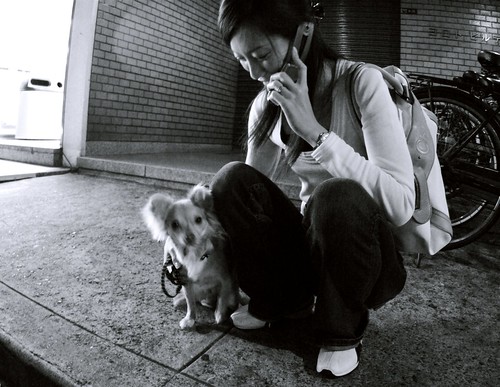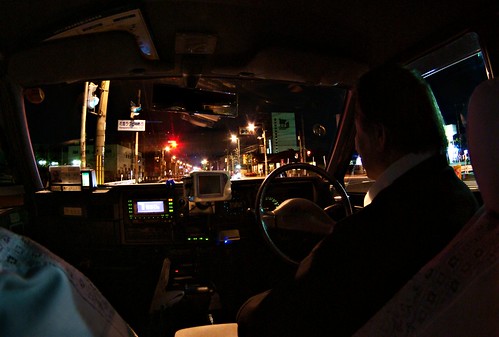Last week the Japanese foreign ministry tentatively suggested that language proficiency be connected to long-term visas. Now, the first (and natural) reaction would be that "oh, another ploy to keep as many foreigners out of the country as possible", but this really does not seem to be the case. Instead, is seems the purpose is the opposite, making it easier than before to gain a long-term visa as a way to promote language fluency, and to have more long-term immigrants be proficient in the language.
The announcement was very careful about emphasizing that it would not make it more difficult to gain visas for non-speakers than it already is today; instead the purpose is to make it easier for those who do gain Japanese proficiency to stay. The article in Japan Today gives as an example lessening the required work experience for engineers if they have attained a certain level of language fluency. Other sources have implied that the term length of visas to be granted could be affected as well; several kinds of visas (like spouse of a Japanese national) actually come in several terms - like six months, a year and three years - before they need to be renewed, and one suggestion is apparently to give proficient speakers the longer-term visas earlier.
This is actually a very good idea, and one that I suspect they can get very broad support for. It hits all the right buttons for a lot of people: liberals will like the prospect of making it easier for committed people to stay; the right-wing nationalists will love the idea of making the Japanese language a requirement for anything; business interests will like the broadening pool of skilled employees being made available. And for us foreigners - yes, it's a good thing for us too. Remember, the idea is not to make it more difficult than it already is if you don't know Japanese (and to be fair, Japan is really not that difficult, visa-wise, compared to a lot of countries), but you get a real, substantial benefit if you do choose to spend all that time studying.
All statements are very vague, but the general consensus seems to be (and I agree) that this really is a preparative step in accepting more long-term immigration in response to the shrinking workforce. And - coming from a country with a large number of immigrants - since many of the problems associated with immigration stem in part from a lack of language ability, making this a condition is only prudent. It's not like Japan would be particularly exceptional if this was enacted either; Canada, for instance, gives you a bonus both for knowing English and French if you want to move there.
And really - people who are indifferent or negative towards a country do not spend years studying its language. The kind of people that willingly go through with something like that are enthusiastic, even passionate, about it, and should be exactly the kind of people you'd want to encourage to come.
I think this plan may actually be further along than the articles say and than people think. The article in Japan Today above specifically mentions the JLPT as the test to use for measuring proficiency, and there's what seems to be quite solid rumours that the JLPT is being redesigned right now, with a new, intermediate level between level 2 and the top level 1. A long-standing criticism of the test has been that the jump from 2 to 1 is very large, and that level 1 tests a lot of things that aren't very useful in daily life. The redesign is rumoured to add an intermediate level, while possibly push the current level 1 a bit further still. Another rumour - less reliable - hints at the test will be given twice a year rather than just once. The new test is apparently due to be tried out this summer and deployed for real in 2009.
As it happens, an intermediate level above level 2 would be perfect as a "proficient" level for work-related purposes. Level 2 itself is still a little on the low side, while the current level 1 is overkill in several ways. Having a "pre-1" that focuses on proficiency in practical use and making level 1 a real nerdcore test of obscure language points would both make for a better test and fit nicely with these visa plans. And, of course, making the JLPT count for visa determinations means you need to give the test reasonably often so that people don't get left hanging. The rumours of giving it twice a year thus fit in nicely as well.
If the new test is now designed to be rolled out in spring 2009, then that would give textbook authors time to create new study materials and give the test administration a year - a spring session and a winter session - to iron out any problems if the new immigration law is adopted in the spring Diet session a year from now and implemented from April 1st 2010. Time will tell, but I hope it'll happen.
Tuesday, January 29, 2008
Sunday, January 27, 2008
Commuting time
The weekend section of Asahi Shinbun has a fun regular feature where they present some recent surprising statistic (ok, I think it's fun; your mileage may vary). It's short and simple enough that I can read it without too much trouble. Today they displayed the total one-way commuting time for students (including university students) and workers, respectively, in the Tokyo and Osaka areas, and how it changes over time (sorry, not online; I eyeballed the numbers for the Osaka area in the graph below). The current one-way average time for students and workers is about 72 and 67 minutes around Tokyo and 76 and 63 minutes around Osaka.
The piece highlights the fact that students in fact spend more time than workers on the commute though the common perception is very much the opposite. I find two other things more interesting, though: first that my own commute, at an hour and ten minutes, is just about exactly average. And since I travel against the flow so to speak - out of the city in the morning, in again at night - I get to sit quite comfortably for most of my trip; I have nothing at all to complain about in other words.
The other interesting thing is the dip in the graph. The 1995 peak coincides with the economical bubble in Japan and the subsequent dip with the recession. What, I wonder, is the actual reason for that?
It's not employment directly. The survey is the time taken for commuters, so people not commuting - like the unemployed - aren't counted. Besides, the school commute shows the same peak and dip, and I don't think school attendance swings up and down along with employment. If anything, university and trade school enrolment would tend to move in the opposite direction as people without work choose to study instead.
So the distance commuted is changing, perhaps. People move closer to their workplace when economy is bad, and further away when it is good. Not impossible: move to leafy suburbs with big houses in good times, or scrimp and save in cheap company-owned dormitories in bad. The overall trend would be explained as well, with more people moving to suburbs over time. But while the underlying trend may be explained in part by this it doesn't feel like you'd see such a large effect from the bubble, recession and recovery on this short a time scale. And it's not changing to jobs closer or further away either; if anything I'd expect the average workplace to be further away in a recession, as you can't be as picky about what job you take.
So perhaps distance doesn't change but the time taken does. The government will tend to splurge on public infrastructure in down years in order to stimulate the economy - you'd get more bus lines, denser train departures and new roads, bridges and tunnels; the Japanese government is of course notorious for spending money in this manner. But then, those bridges or buses don't generally disappear again in boom years (the great thing about infrastructure is that it tends to stick around), so you wouldn't see such a neat uptick in commuting time in good years.
The final possibility - and my guess - is other commuters. With a better economy you have more people commuting. Which means more traffic congestion, full trains and delayed buses. And I suspect especially that in a boom economy more people use their car rather than public transport, something which especially in dense urban areas can actually take you longer than the subway (and longer still, of course, when stuck in a traffic jam due to all the other car-borne commuters).
So, if the trip to work or school seems to take longer than ever, be happy - things are going well overall in other words. If your commute is getting faster and smoother on the other hand, it's time to worry about job security. And if you're the only living person in sight one morning, it's time to wonder if you perhaps should have paid a bit more attention to that news flash on some radioactive giant reptile attacking the city. Remember, learning important Japanese like "怪獣" (kaijuu) may save your life one day. Or at least let you sleep late one morning.
The piece highlights the fact that students in fact spend more time than workers on the commute though the common perception is very much the opposite. I find two other things more interesting, though: first that my own commute, at an hour and ten minutes, is just about exactly average. And since I travel against the flow so to speak - out of the city in the morning, in again at night - I get to sit quite comfortably for most of my trip; I have nothing at all to complain about in other words.
The other interesting thing is the dip in the graph. The 1995 peak coincides with the economical bubble in Japan and the subsequent dip with the recession. What, I wonder, is the actual reason for that?
It's not employment directly. The survey is the time taken for commuters, so people not commuting - like the unemployed - aren't counted. Besides, the school commute shows the same peak and dip, and I don't think school attendance swings up and down along with employment. If anything, university and trade school enrolment would tend to move in the opposite direction as people without work choose to study instead.
So the distance commuted is changing, perhaps. People move closer to their workplace when economy is bad, and further away when it is good. Not impossible: move to leafy suburbs with big houses in good times, or scrimp and save in cheap company-owned dormitories in bad. The overall trend would be explained as well, with more people moving to suburbs over time. But while the underlying trend may be explained in part by this it doesn't feel like you'd see such a large effect from the bubble, recession and recovery on this short a time scale. And it's not changing to jobs closer or further away either; if anything I'd expect the average workplace to be further away in a recession, as you can't be as picky about what job you take.
So perhaps distance doesn't change but the time taken does. The government will tend to splurge on public infrastructure in down years in order to stimulate the economy - you'd get more bus lines, denser train departures and new roads, bridges and tunnels; the Japanese government is of course notorious for spending money in this manner. But then, those bridges or buses don't generally disappear again in boom years (the great thing about infrastructure is that it tends to stick around), so you wouldn't see such a neat uptick in commuting time in good years.
The final possibility - and my guess - is other commuters. With a better economy you have more people commuting. Which means more traffic congestion, full trains and delayed buses. And I suspect especially that in a boom economy more people use their car rather than public transport, something which especially in dense urban areas can actually take you longer than the subway (and longer still, of course, when stuck in a traffic jam due to all the other car-borne commuters).
So, if the trip to work or school seems to take longer than ever, be happy - things are going well overall in other words. If your commute is getting faster and smoother on the other hand, it's time to worry about job security. And if you're the only living person in sight one morning, it's time to wonder if you perhaps should have paid a bit more attention to that news flash on some radioactive giant reptile attacking the city. Remember, learning important Japanese like "怪獣" (kaijuu) may save your life one day. Or at least let you sleep late one morning.
Saturday, January 26, 2008
..and exhale.
Deadlines are necessary. They're unavoidable. They are even beneficial - I would not get half as much done if I wasn't occasionally pinned in a corner like a rabid rat by a looming deadline. The feeling of beating a deadline, of handing in the work finished and on time, is wonderful. But the actual bit when you struggle to make recalcitrant hardware and software behave as intended as the clock creeps towards the end is, well, not so much.
This deadline was for a conference to be held in Osaka this summer, and I managed to submit the paper on time. Actually, I lie. I was late, very late - but then, so was most everybody else. What happened was a deadline extension. The actual deadline was two weeks ago, a deadline that got extended to yesterday evening. And since I knew the deadline would most likely be extended I wasn't even close to finished with my submission for the original deadline - the system was still not working and the paper was little more than a vague outline. The original deadline came and went with me not even trying to meet it.
So how did I know there'd be an extension? Did I perhaps know one of the organizers, or did I send an army of tiny robotic cockroaches to spy on my behalf? Not at all. Every scientific conference has a deadline extension. It used to be that conferences had a deadline and if you missed it, well good luck next year. But then, in extrardinary circumstances - you couldn't get you submission typed out on time perhaps, or the postal service fell down on the job - you could ask for a few extra days. But gradually, as more and more people asked for extra time, conferences began granting extra time to everyone so that some people would not have that extra edge.
And now, of course, every conference does it. They have no choice; most people just never submit anything for the original deadline, knowing that there'll be an extension anyway. Not granting an extension would be tantamount to canceling the conference. This it is bad for everybody. You used to know exactly when your paper was due. Now the deadline is in some fuzzy time period of between a week to a month after the posted time, and you won't find out exactly when until just before the original deadline. And it's bad for the organizers that have to plan around a "real" deadline as well as a later one (you need to line up reviewers and make sure they're available for instance).
But nobody can really do anything about it. It's a very neat game-theoretic trap: no conference can skip the extension because people know all other conferences grant them so they'd be severely hurt. And since they grant extensions, so, in turn, must everybody else. Instead, some conferences have begun granting second extensions; there's still people with legitimate reasons to be late, after all, and not giving them a bit of extra time would be churlish. Expect to see a second extension become standard within he next ten-fifteen years. Of course, the time needed to process submissions is much less than it used to be so no real harm done I guess. I look forward to the day when you can show up on the opening day of a conference, paper in hand, and have it reviewed by on-site reviewers, revised and accepted as a poster before the day ends.
This deadline was for a conference to be held in Osaka this summer, and I managed to submit the paper on time. Actually, I lie. I was late, very late - but then, so was most everybody else. What happened was a deadline extension. The actual deadline was two weeks ago, a deadline that got extended to yesterday evening. And since I knew the deadline would most likely be extended I wasn't even close to finished with my submission for the original deadline - the system was still not working and the paper was little more than a vague outline. The original deadline came and went with me not even trying to meet it.
So how did I know there'd be an extension? Did I perhaps know one of the organizers, or did I send an army of tiny robotic cockroaches to spy on my behalf? Not at all. Every scientific conference has a deadline extension. It used to be that conferences had a deadline and if you missed it, well good luck next year. But then, in extrardinary circumstances - you couldn't get you submission typed out on time perhaps, or the postal service fell down on the job - you could ask for a few extra days. But gradually, as more and more people asked for extra time, conferences began granting extra time to everyone so that some people would not have that extra edge.
And now, of course, every conference does it. They have no choice; most people just never submit anything for the original deadline, knowing that there'll be an extension anyway. Not granting an extension would be tantamount to canceling the conference. This it is bad for everybody. You used to know exactly when your paper was due. Now the deadline is in some fuzzy time period of between a week to a month after the posted time, and you won't find out exactly when until just before the original deadline. And it's bad for the organizers that have to plan around a "real" deadline as well as a later one (you need to line up reviewers and make sure they're available for instance).
But nobody can really do anything about it. It's a very neat game-theoretic trap: no conference can skip the extension because people know all other conferences grant them so they'd be severely hurt. And since they grant extensions, so, in turn, must everybody else. Instead, some conferences have begun granting second extensions; there's still people with legitimate reasons to be late, after all, and not giving them a bit of extra time would be churlish. Expect to see a second extension become standard within he next ten-fifteen years. Of course, the time needed to process submissions is much less than it used to be so no real harm done I guess. I look forward to the day when you can show up on the opening day of a conference, paper in hand, and have it reviewed by on-site reviewers, revised and accepted as a poster before the day ends.
Sunday, January 20, 2008
New Year - After
By tradition people put some importance on the first instance of any action of the new year. It is vaguely seen as setting the tone for the year: do something well the first time and the task will go well throughout the year. The first shrine visit, for instance, is a very common tradition of the new years day. For some reason this newness kind of "wears off" after a week or ten days, so even if you do something for the first time after that it no longer seems to count.
While the first temple visit is undoubtedly important for quite a lot of people, the tradition that really get people going is the new year sale, complete with "Lucky Bags". On January second, most stores open for one of the big sales of the year - children have New Years money burning in their pockets; salarymen have their year-end bonuses in the bank and the whole family is probably feeling a little cooped-up and frustrated after three or four days of enforced free time spent with each other and with assorted relatives.

Shinsaibashi shopping street on the second day of the year. If you ever wonder what a lot of Japanese do as a hobby wonder no more. Of course, just like us many people come out to watch the crowds as much as anything else.
The idea of lucky bags, fukubukuro, is that the store packs bags with merchandize and sells them with a hefty rebate, and you buy them without knowing exactly what you'll be getting. In practice, sometimes you'll be shown exactly what you'll get and sometimes it will be a complete surprise. They can range in price from a few hundred yen up to hundreds of thousands of yen, and cover such diverse items as clothing (you do get to pick a bag your size), skin care products, camera accessories, cars (you know the overall type but not the model or color) and - I'm not kidding - a wedding ceremony and reception.

This fukubukuro at a men's suit store is where the idea of lucky bags kind of fall apart. You're supposed to be surprised by the contents, after all, but I'm just not convinced that "dark suit, white shirt, striped tie" will be any kind of surprise for a patron of this store. Of course I could be wrong and you actually get a pearl-white tuxedo and top hat with sparklies. I doubt it, though.


We had to buy one lucky bag of some sort, and you can never go wrong with food. This bag was bought at a pickles store, and contains a number of umeboshi-related goodies. We got actual umeboshi to the left; small onions pickled in ume and shiso vinegar, then pickled ume to the center right. In the front is shredded, dried umeboshi to spread on your rice, and in the back right caramel candies with umeboshi bits inside. I may have to go back for more of those candies one day; they're really excellent and Ritsuko has already eaten most of the ones we got.
While the first temple visit is undoubtedly important for quite a lot of people, the tradition that really get people going is the new year sale, complete with "Lucky Bags". On January second, most stores open for one of the big sales of the year - children have New Years money burning in their pockets; salarymen have their year-end bonuses in the bank and the whole family is probably feeling a little cooped-up and frustrated after three or four days of enforced free time spent with each other and with assorted relatives.

Shinsaibashi shopping street on the second day of the year. If you ever wonder what a lot of Japanese do as a hobby wonder no more. Of course, just like us many people come out to watch the crowds as much as anything else.
The idea of lucky bags, fukubukuro, is that the store packs bags with merchandize and sells them with a hefty rebate, and you buy them without knowing exactly what you'll be getting. In practice, sometimes you'll be shown exactly what you'll get and sometimes it will be a complete surprise. They can range in price from a few hundred yen up to hundreds of thousands of yen, and cover such diverse items as clothing (you do get to pick a bag your size), skin care products, camera accessories, cars (you know the overall type but not the model or color) and - I'm not kidding - a wedding ceremony and reception.

This fukubukuro at a men's suit store is where the idea of lucky bags kind of fall apart. You're supposed to be surprised by the contents, after all, but I'm just not convinced that "dark suit, white shirt, striped tie" will be any kind of surprise for a patron of this store. Of course I could be wrong and you actually get a pearl-white tuxedo and top hat with sparklies. I doubt it, though.


We had to buy one lucky bag of some sort, and you can never go wrong with food. This bag was bought at a pickles store, and contains a number of umeboshi-related goodies. We got actual umeboshi to the left; small onions pickled in ume and shiso vinegar, then pickled ume to the center right. In the front is shredded, dried umeboshi to spread on your rice, and in the back right caramel candies with umeboshi bits inside. I may have to go back for more of those candies one day; they're really excellent and Ritsuko has already eaten most of the ones we got.
Thursday, January 17, 2008
New Year - Before
Once again a New Year has been inflicted upon us. The glue on the final in-store Christmas tinsel had not yet time to set before it was all yanked down to be replaced with traditional New Years decorations, while harmonica-renderings of Rudolf the Red-Nosed Reindeer got cut mid-wail to be replaced by endless loops of Koto music.
The nice thing about having a real New Year holiday is how neatly you can fit a lot of symbolism into it - finishing things up before the big break; starting things anew after. Both households and companies tend to do a major housecleaning before the holiday; smaller shops and restaurants may close up completely and spend a day cleaning the whole place, top to bottom. Then, after the New Year, you can start up again in fresh, clean offices and shops.
The New Years food (called "osechi ryouri") is a reflection of this. It is cold food, prepared before the new years eve but eaten afterwards. Unlike Europe you do not have a feast on New Years eve in other words, though some people with big appetites and little patience cheat a bit and start on the osechi ryouri after midnight rather than wait to the next morning. People can spend sometimes a week beforehand making various traditional and not-so-traditional dishes, in order to (theoretically) not have to cook at all for a few days in the beginning of the new year.


Huge numbers of people were milling in Kuromon market, buying up ingredients for the New Years holiday. Fugu - the famed poisonus-but-safe fish - was being sold everywhere. Not my favourite; remove the "it can kill you!" bit (which is rather hyped) and it's a nice but way overpriced firm white-meat fish.
We did not win ready-made osechi ryouri this year for some inexplicable reason, so we made our own. It's fun and you get to eat only food you like. We bought a lot of the food of course (nobody makes their own kamaboko or konnyaku, though it would be fun to try once), but we did make kuromame, homemade soba (buckwheat noodles - I'm making a separate post about that) and XXX among other things. The kuromame ("black bean") turned out really well; it is a kind of dried gray bean that is soaked, then simmered in a dark soy and mirin-based sauce for a day or so together with a rusty nail (the rust helps turn them black). We had to scour a torn down building nearby to find a suitable nail, actually - pre-rusted nails are not a common article in kitchen supply-stores it seems. We've saved the nail for next year.

Our New Years food. The tower thingy on the upper left is mochi (sticky rice) and a mikan, and is a traditional decoration. The miso soup is also traditional style, with a very light, sweet kind of miso, root vegetables and mochi (which manages to kill people every year). The flower-like slices on the bottom left is kamaboko (baked fish paste - think "fiskbullar" for Swedish speakers) made with a boiled egg in the center. On the upper right there's kuromame (black beans) and gomame - dried fish sauteed in soy sauce, mirin and sake. Gomame, by the way, is possibly my favourite thing on this table.
The nice thing about having a real New Year holiday is how neatly you can fit a lot of symbolism into it - finishing things up before the big break; starting things anew after. Both households and companies tend to do a major housecleaning before the holiday; smaller shops and restaurants may close up completely and spend a day cleaning the whole place, top to bottom. Then, after the New Year, you can start up again in fresh, clean offices and shops.
The New Years food (called "osechi ryouri") is a reflection of this. It is cold food, prepared before the new years eve but eaten afterwards. Unlike Europe you do not have a feast on New Years eve in other words, though some people with big appetites and little patience cheat a bit and start on the osechi ryouri after midnight rather than wait to the next morning. People can spend sometimes a week beforehand making various traditional and not-so-traditional dishes, in order to (theoretically) not have to cook at all for a few days in the beginning of the new year.


Huge numbers of people were milling in Kuromon market, buying up ingredients for the New Years holiday. Fugu - the famed poisonus-but-safe fish - was being sold everywhere. Not my favourite; remove the "it can kill you!" bit (which is rather hyped) and it's a nice but way overpriced firm white-meat fish.
We did not win ready-made osechi ryouri this year for some inexplicable reason, so we made our own. It's fun and you get to eat only food you like. We bought a lot of the food of course (nobody makes their own kamaboko or konnyaku, though it would be fun to try once), but we did make kuromame, homemade soba (buckwheat noodles - I'm making a separate post about that) and XXX among other things. The kuromame ("black bean") turned out really well; it is a kind of dried gray bean that is soaked, then simmered in a dark soy and mirin-based sauce for a day or so together with a rusty nail (the rust helps turn them black). We had to scour a torn down building nearby to find a suitable nail, actually - pre-rusted nails are not a common article in kitchen supply-stores it seems. We've saved the nail for next year.

Our New Years food. The tower thingy on the upper left is mochi (sticky rice) and a mikan, and is a traditional decoration. The miso soup is also traditional style, with a very light, sweet kind of miso, root vegetables and mochi (which manages to kill people every year). The flower-like slices on the bottom left is kamaboko (baked fish paste - think "fiskbullar" for Swedish speakers) made with a boiled egg in the center. On the upper right there's kuromame (black beans) and gomame - dried fish sauteed in soy sauce, mirin and sake. Gomame, by the way, is possibly my favourite thing on this table.
Saturday, January 12, 2008
Dog names
If there was any doubt that this country is obsessed with food, Asahi Shinbun reports today that the three most common dog names this year is "Choko" (chocolate), "Maron" (chestnut) and "Momo" (peach). All three of which are popular ice cream flavours. The once-upon-a-time favourite "Pochi" is now only the 223rd most popular.
The article was really about how Matsushita is changing its name to Panasonic to reflect its most popular brand; the dog name part is a lot more fascinating, though.
The article was really about how Matsushita is changing its name to Panasonic to reflect its most popular brand; the dog name part is a lot more fascinating, though.
Friday, January 11, 2008
On Ombudsmen and Portfolios
There's been a long string of food safety and other consumer scandals here lately - enough that the "kanji of the year" became "偽" (nise), "deception" (with the runner up "食" (shoku) food, and third place "嘘" (uso) lie - you know, just to ram it home properly). This issue hasn't gone unnoticed in political circles, so recently the opposition party DPJ proposed the establishment of an Ombudsman for "consumer affairs". Observing Japan (good blog - read it) just posted that the LDP government now is counter-proposing a ministerial portfolio for "consumer affairs". This shows a significant difference of opinion on what "consumer affairs" is, exactly; or, in any case, shows the appearance of such.
Background
A bit of political background: here we have the perpetually-in-power conservative party LDP. It is a fairly loose organization with a number of internal factions ranging from somewhat liberal to the blackest of nationalistic reactionaries. LDP is currently, with the aid of New Komeito (a small Buddhist party), in power of the all-important lower house. The main opposition party is the DPJ, which is a loose conservative party with factions ranging from liberal to pretty scarily conservative. LDP got trounced in the upper house election last year (as did New Komeito) over the slapstick-tragedy handling of lost pension accounts, so DPJ now has control over the upper house, and if there is a general election for the lower house anytime soon, LDP looks pretty likely to lose power there as well (for only the second time ever).
The actual differences between LDP and DPJ are small by most standards - on most issues the difference between the parties are a lot smaller than the difference of views of factions within each party. Which party is in control is thus not going to make much of a difference in the actual governance of the country; instead, voting is mostly about approval of the current government rather than about any choice of political direction (direction is chosen by internal faction politics, not public elections). As a consequence, framing issues in terms of government performance become all-important for both parties.
Proposals
"Ombudsman" is a Swedish word - one of the very few entering the international vocabulary in current times. It means "representative", and is originally specifically a person or office tasked with representing the public against the government, especially regarding government or institutional abuse of powers. As such, an ombudsman's office is set to be independent of the government or organization it oversees and has powers (sometimes far-reaching powers) to collect information, get access to officials, aid citizens in court cases and take cases to court themselves.
Advocating a ministerial portfolio for consumer affairs effectively argues that the problem is a lack of regulation or oversight. "Consumer affairs" is in this view about dishonest producers, cheating merchants and lack of quality control. Reasonable enough - many of the scandals have been about inappropriate or mislabeled ingredients, expiration date cheating or outright lying to consumers. In this - the LDP - view, the task is to tighten regulations and increase controls so that dishonest businesses won't get away with it, harming the honest merchants in the process. It is a matter of confidence in the industry and making sure that some bad eggs (sic) don't ruin it.
Advocating for an Ombudsman like DPJ does, on the other hand, is effectively saying that "consumer affairs" is a problem with the government and the state and regional bureaucracies; that they are taking sides for producers, manufacturers and other businesses, short-changing the consumer. In this view, errant companies defrauding consumers is not the actual problem but an effect of a regulatory and legal system set up for the benefit of business rather than consumers (and when you look at current and historical events, this frankly seems a rather more accurate view than the alternative "bad eggs" view above).
So here we at have a real, substantive policy difference between these two parties. Either the government is not doing enough policing and needs to do more to combat consumer fraud and cheating; or the government has a damaging pro-business-only outlook that facilitates abuse and has to shift towards a focus on consumer rights.
Except, I can't stop wondering - is it really a coincidence that the party who holds power advocates a solution that exonerates the government while increasing its reach, while the party that does not proposes a solution that blames bad governance and seeks to regulate it? The cynic in me believes that had the roles been reversed, so would the solutions. And it rather strongly suspects that neither suggestion was made with any intention of actually implementing them and any result will be a toothless, purely symbolic one good enough to generate a quick ten seconds on the news.
Background
A bit of political background: here we have the perpetually-in-power conservative party LDP. It is a fairly loose organization with a number of internal factions ranging from somewhat liberal to the blackest of nationalistic reactionaries. LDP is currently, with the aid of New Komeito (a small Buddhist party), in power of the all-important lower house. The main opposition party is the DPJ, which is a loose conservative party with factions ranging from liberal to pretty scarily conservative. LDP got trounced in the upper house election last year (as did New Komeito) over the slapstick-tragedy handling of lost pension accounts, so DPJ now has control over the upper house, and if there is a general election for the lower house anytime soon, LDP looks pretty likely to lose power there as well (for only the second time ever).
The actual differences between LDP and DPJ are small by most standards - on most issues the difference between the parties are a lot smaller than the difference of views of factions within each party. Which party is in control is thus not going to make much of a difference in the actual governance of the country; instead, voting is mostly about approval of the current government rather than about any choice of political direction (direction is chosen by internal faction politics, not public elections). As a consequence, framing issues in terms of government performance become all-important for both parties.
Proposals
"Ombudsman" is a Swedish word - one of the very few entering the international vocabulary in current times. It means "representative", and is originally specifically a person or office tasked with representing the public against the government, especially regarding government or institutional abuse of powers. As such, an ombudsman's office is set to be independent of the government or organization it oversees and has powers (sometimes far-reaching powers) to collect information, get access to officials, aid citizens in court cases and take cases to court themselves.
Advocating a ministerial portfolio for consumer affairs effectively argues that the problem is a lack of regulation or oversight. "Consumer affairs" is in this view about dishonest producers, cheating merchants and lack of quality control. Reasonable enough - many of the scandals have been about inappropriate or mislabeled ingredients, expiration date cheating or outright lying to consumers. In this - the LDP - view, the task is to tighten regulations and increase controls so that dishonest businesses won't get away with it, harming the honest merchants in the process. It is a matter of confidence in the industry and making sure that some bad eggs (sic) don't ruin it.
Advocating for an Ombudsman like DPJ does, on the other hand, is effectively saying that "consumer affairs" is a problem with the government and the state and regional bureaucracies; that they are taking sides for producers, manufacturers and other businesses, short-changing the consumer. In this view, errant companies defrauding consumers is not the actual problem but an effect of a regulatory and legal system set up for the benefit of business rather than consumers (and when you look at current and historical events, this frankly seems a rather more accurate view than the alternative "bad eggs" view above).
So here we at have a real, substantive policy difference between these two parties. Either the government is not doing enough policing and needs to do more to combat consumer fraud and cheating; or the government has a damaging pro-business-only outlook that facilitates abuse and has to shift towards a focus on consumer rights.
Except, I can't stop wondering - is it really a coincidence that the party who holds power advocates a solution that exonerates the government while increasing its reach, while the party that does not proposes a solution that blames bad governance and seeks to regulate it? The cynic in me believes that had the roles been reversed, so would the solutions. And it rather strongly suspects that neither suggestion was made with any intention of actually implementing them and any result will be a toothless, purely symbolic one good enough to generate a quick ten seconds on the news.
Tuesday, January 8, 2008
A New Beginning
The new year has well and truly begun and I'm already in over my head with work. Positive spin: "The sooner you fall behind the more time you have to catch up."
The observant reader might have noticed that the Flickr pictures I've been posting lately seem to have a far more balmy, even summer-like tone than is usual for January. Reason being, of course, that I'm far behind on posting pictures as well. As part of my "New Improved Life Of 2008" I have resolved to clear out this backlog, so I don't even bring my camera most days in order for me to focus on getting my old pictures in order instead of adding to the pile.
See you on the other side of deadline.
The observant reader might have noticed that the Flickr pictures I've been posting lately seem to have a far more balmy, even summer-like tone than is usual for January. Reason being, of course, that I'm far behind on posting pictures as well. As part of my "New Improved Life Of 2008" I have resolved to clear out this backlog, so I don't even bring my camera most days in order for me to focus on getting my old pictures in order instead of adding to the pile.
See you on the other side of deadline.
Tuesday, January 1, 2008
2007 Pictures
I'm shamelessly copying a neat idea from Shisaku and posting one picture from each month of last year. Not necessarily the most significant image, but just the one I like best from among those that I've posted on Flickr.
January
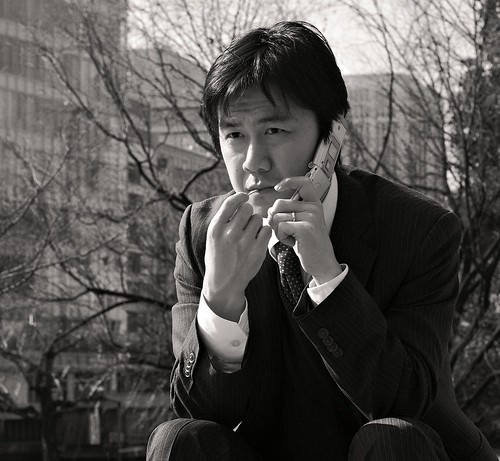
Lots of cool, clear days in February. Here an office worker during his lunch hour outside Osaka City hall, Nakanoshima.
February
March

In March we travelled to Ho-Chi-Minh City in Vietnam. The manager of an outside eatery behind the Saigon Central Mosque is taking a rest.
April
May
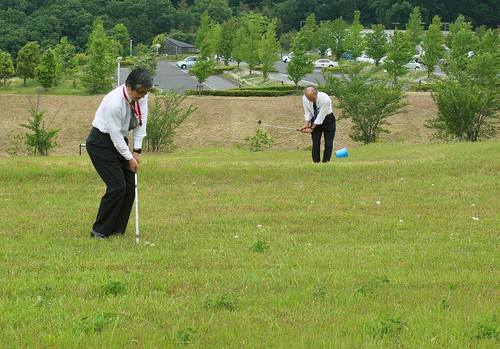
Golf is popular - insanely so. A couple of office workers spend their lunch hitting balls across a lawn.
June
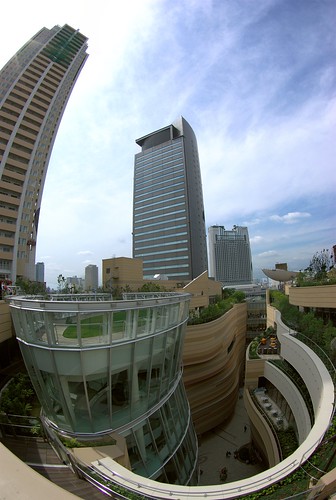
Namba Parks is a fairly new shopping center in south Osaka. Huge, with lots of stores, restaurants and movie theaters, and it has this neat terraced park on the roof as well. Worth a visit.
July
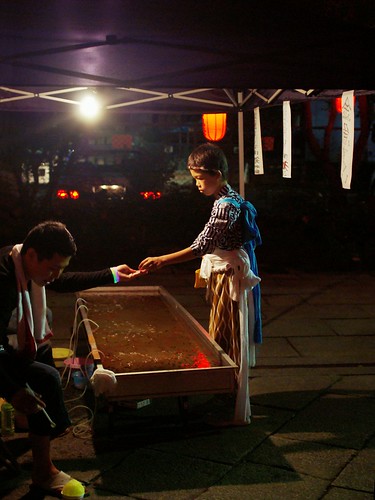
Summer is a time for festivals. This is a game where you try to catch a goldfish with a small paper net; the net dissolves pretty quickly so you have to be fast.
August
September
October
November
December
January

Lots of cool, clear days in February. Here an office worker during his lunch hour outside Osaka City hall, Nakanoshima.
February
March

In March we travelled to Ho-Chi-Minh City in Vietnam. The manager of an outside eatery behind the Saigon Central Mosque is taking a rest.
April
May

Golf is popular - insanely so. A couple of office workers spend their lunch hitting balls across a lawn.
June

Namba Parks is a fairly new shopping center in south Osaka. Huge, with lots of stores, restaurants and movie theaters, and it has this neat terraced park on the roof as well. Worth a visit.
July

Summer is a time for festivals. This is a game where you try to catch a goldfish with a small paper net; the net dissolves pretty quickly so you have to be fast.
August
September
October
November
December
Subscribe to:
Comments (Atom)







